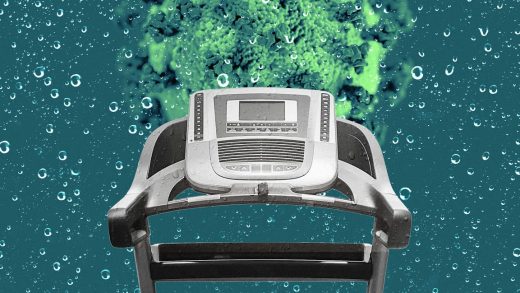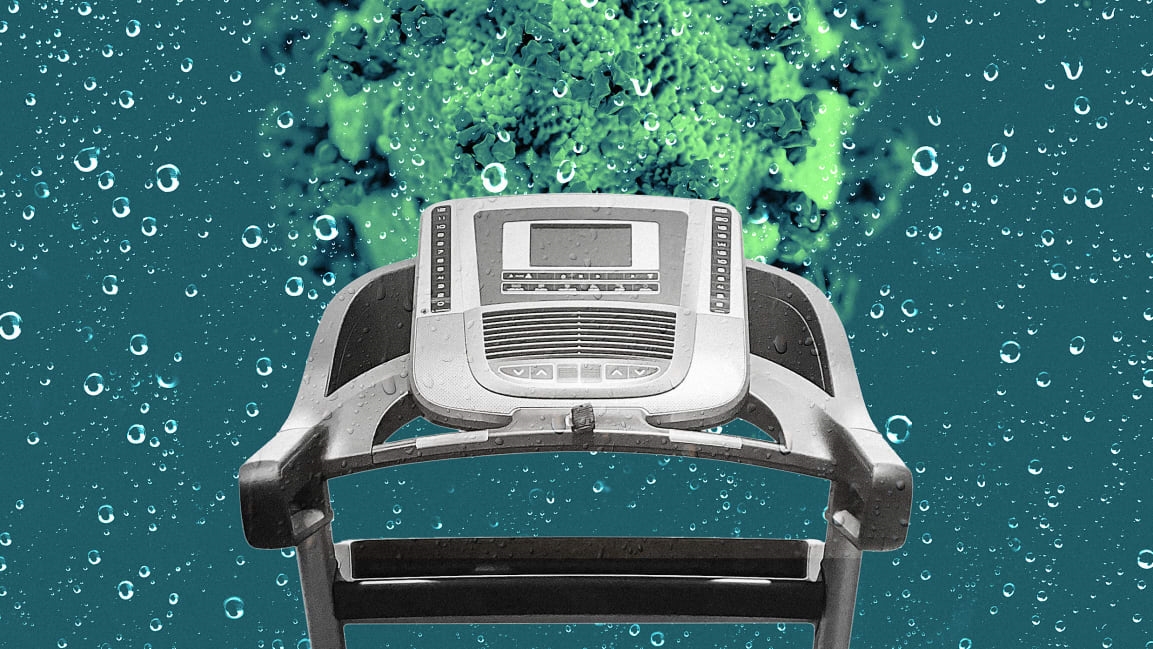What gyms are doing to prevent coronavirus
Gyms are generally not very hygienic places. Your trusty treadmill may have 74 times as much bacteria as a water faucet. And those free weights you’re curling with may have 362 times more bacteria than toilet seats.
These were some of the unsettling findings when a mold testing lab, EMLab P&K, took swabs at three different chain gym locations, and on 27 pieces of equipment, to assess the levels of microbes in fitness centers. That 2016 test, though, measured bacteria; the coronavirus is a virus. Still, at a time when we’re being retrained in hygiene best practices—and trying to resist every temptation to touch our own faces—gyms are addressing how to minimize the risk of transmission in one of the most intimate, communal, and sweaty places we visit in our daily lives. While many offices have issued employees contingency plans for working from home in case of an outbreak, it’s perhaps less feasible to work out from home. So, some fitness centers have started to plan ahead.
Just as the tiny coronaviruses (which have a spiked outer layer, resembling the sun’s corona) can last on hard, nonporous surfaces such as bus poles and faucets for up to nine days, the same is true for gym equipment. The World Health Organization noted that certain strains of the SARS-CoV, a close relative to COVID-19, can persist on stainless steel—think dumbbell and barbell handles—for 72 hours at room temperature, and on plastic—think treadmill and cross-trainer grips—for about the same amount of time.
In 2018, Mark Dalman, an assistant professor at Kent State University, found that fitness facilities across northeast Ohio carried equipment rife with the Staphylococcus aureus bacterium, and that the most contaminated gear, in order of rifeness with germs, was: the medicine ball, the cable curl bar, the box jump boxes, weight plates, and the treadmill handle.
Again, that’s a different microbe, but the coronavirus is also very infectious in such close quarters, Dalman says. “Spreading in a confined area would be enhanced in a gym setting,” Dalman tells Fast Company, because the chances of getting close to others in the gym is high, there’s a constant influx of people, and sharing equipment is a given. The lingering droplets—most infectious when still wet—can be neutralized on these nonporous surfaces with disinfectant wipes.
Adam Zeitsiff, president and CEO of Gold’s Gym, which has over 400 sites across the country, said in a statement that his outlet is “stepping up efforts” to ensure hand-sanitizing stations are available and functional.
Natalie Bushaw, a spokesperson from Life Time, a nationwide fitness chain with 150 branches, tells us, “We are adding more sanitizing stands throughout the clubs as a precautionary measure, and to encourage use.” Though she doesn’t have a concrete number of disinfectant purchases, she says, “we’re overindexing out of an abundance of caution.” She specifically mentioned that Life Time uses the Purell brand.
GOJO Industries, the company that manufactures Purell, shared a statement that said demand for products, including wipes and sanitizing stations, has increased substantially. “We have experienced several demand surges in the past during other outbreaks—and this is on the higher end of the spectrum, but not unprecedented,” the statement added. In response to demand, GOJO says it has increased production significantly. The Clorox Company also shared a statement. “While we can’t comment on sales to gym chains or product-specific sales, we can share that the overall disinfecting wipes category is up, and we’re seeing strong consumption for our Clorox disinfecting wipes in recent weeks.”
As with any location, including your home, Dalman says that the likelihood of disease contraction depends on the cleanliness of the individual site. That’s especially important for YMCA gyms, which operate under a federated model, meaning each of the 2,600 local Ys is responsible for its own cleaning procedures.
Dalman suggests that pausing gym activity in the middle of the day to add an extra cleaning shift could be useful. Many chains mentioned their newly intensive cleaning routines. Equinox members received an email memo, which reported that the management disinfects all areas with a “hospital-grade solution” at the end of each day, but that it’s now “also introducing additional mid-morning and mid-afternoon disinfects as an extra precaution.”
Nirav Patel, chief medical officer at University Medical Center New Orleans, suggests that gyms are not any more of a worry than other public forums—especially because if people are sick, they won’t want to work out anyway. “Most people that go to gyms are healthy,” Patel tells Fast Company, “and that, in a sense, is protective. When people get sick, a lot of people sort of don’t work out because they’re coughing and sneezing and hacking.” Soul Cycle, also owned by Equinox Fitness, guaranteed that it would start honoring late cancellations. “Stay home if you’re feeling sick,” the note advised.
Sharing equipment, Patel says, is really no different from touching elevator buttons, handles, or doorknobs at the office. Both he and Dalman agree that there’s no current need to close gyms, and Gold’s Gym reports that it hasn’t yet seen any dip in gym attendance. The best thing gyms can do, the experts advise, is encourage a culture of hygiene, in following with CDC guidelines—washing hands thoroughly for 20 seconds, keeping a distance from sick people, and yes, not touching your face. All the gyms we talked to emphasized these general hygiene points.
A couple of the fitness centers do include some of their own niche pointers, perhaps in line with their brands. The YMCA stresses respect for all visitors. “We’re making sure that Ys are remembering to educate both staff and members on the importance of inclusion during a time that many Asian communities are facing stigmatization.”
And, on a statement released via Reddit, the president of Orangetheory Fitness, David Carney, said: “If you don’t want to exchange a high five with the coach, we understand.”
(34)



